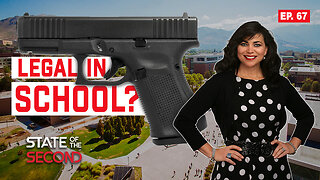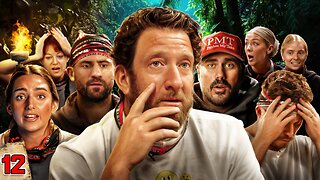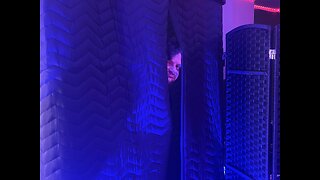Premium Only Content

(5) The Super-Nature of Consciousness
https://www.facebook.com/groups/974332723871967/permalink/1045166666788572/?mibextid=rS40aB7S9Ucbxw6v
Chapter 5: The Super-Nature of Consciousness
If a tree falls in the forest (and there is no creature to hear it), does it make a sound?
It depends on what you mean by the word “sound”. If by “sound” you mean a “sound wave”, then the answer is yes; yes of course it makes a “sound wave” that vibrates the leaves, dirt, and other surrounding objects causing subtle (but real) physical changes to them. If by “sound” you mean the “sensation of sound”, then the answer is no; no of course there is not any creature with consciousness to experience the “sensation of sound”.
The first thing I want to point out is that we can only answer a “yes or no question” that is complete. The original “yes or no question” was incomplete because the word “sound” was not clearly defined. Therefore, we can only answer the question once it is completely defined.
The second thing I want to point out is that there is a distinction between “sound wave” and “sensation of sound”. The “sound wave” causes subtle (but real) physical changes to objects. The “sensation of sound” is experienced by a creature with consciousness. The “sound wave” is natural. The “sensation of sound” is supernatural (above nature).
https://www.smashwords.com/extreader/read/801194/10/the-teacher-the-terrorists-and-the-temporal-war
Can a robot experience the sensation of pain?
A robot has the ability to record damage, analyze the damage, calculate a response to the damage, and respond according to the damage. No matter how convincing the illusion may be, a robot is without a “soul”; it does not have consciousness and therefore cannot experience the “sensation of pain”.
A creature with consciousness has the ability to experience the “sensation of pain”. The nervous system has the ability to record damage, analyze the damage, calculate a response to the damage, and respond accordingly to the damage through a reflex. Imagine a creature touches something extremely hot with a limb; the limb is pulled away as a reflex. Afterward, the creature still experiences the “sensation of pain”.
A robot can be programed to use its recorded damage to avoid similar situations in the future. A creature with consciousness can recall past memories of pain, simulate future experiences of pain, and choose to avoid similar situations in the future. The conscious experience of the sensation of pain from a memory or simulation is like a shadow of the real thing; this is similar to how someone can visualize a memory or simulation in his or her “mind’s eye”, which may not be as clear (not as distinct) as the real thing.
A robot is bound to its programming and how its programming rewrites itself based on recorded inputs. A robot can still learn even though it does not experience the “sensation of pain”.
A creature can also learn when the nerve connections of the material brain are modified based on past experiences of pain, which it uses to simulate future experiences of pain. However, the creature also has a “soul” that experiences the “sensation of pain”.
A “soul” is anything capable of having a conscious experience. A “soul” can experience sensations such as the sensation of pain/pleasure, the sensation of touch/pressure, the sensation of darkness/brightness, the sensation of color, the sensation of quiet/loud, the sensation of pitch, the sensation of balance, the sensation of taste, the sensation of smell, the sensation of fear/peace, the sensation of torment/joy, and the sensation of attractive beauty/repulsive ugliness.
https://www.smashwords.com/extreader/read/801194/11/the-teacher-the-terrorists-and-the-temporal-war
A creature is a body and brain with a “soul”, which is capable of having a conscious experience; examples include a human person, an animal creature, or a Nephilim hybrid.
A robot is a body and artificial intelligence without a “soul”, which is not capable of having a conscious experience (an android or an artificial intelligence computer network that is used to control the operation of machines).
An artificial creature is like a robot possessed by an angelic or demonic “soul”, which is capable of having a conscious experience (an android possessed by a demon or an artificial intelligence quantum computer network possessed by a demon).
A creature without free-will (without a mind) can learn much like a robot except that it also has a “soul” that is fated to experience the “sensation of pain” or the “sensation of pleasure” associated with the corresponding learning processes of brain. A creature without free-will (without a mind) is like an observer “soul” that experiences the consequences of the creature’s material body and material brain. Animal creatures are examples of creatures without free-will. Animal creatures have a “soul”, but they do not have a mind.
A creature with free-will has a mind, which it uses to make free choices. The mind is informed by both the processes of the material brain and the conscious experiences of the “soul”. The “soul” still experience the “sensation of pain” or the “sensation of pleasure” associated with the corresponding learning processes of brain, but the “soul” can send feedback to the mind, which can choose to alter some fundamental conditions in the universe affecting the brain. A creature with free-will (with a mind) is like a participant “soul” that experiences the consequences of the creature’s material body and brain (while also transmiting information to the mind, which then communicates back with the creature’s material brain and body). Human persons have both a “soul” and a mind.
The body and brain are natural. The body contains sensory organs and muscles that communicate with the brain via the nervous system. The soul and mind are supernatural. The soul receives information from the brain but does not transmit any information directly back to the brain. The mind receives information from both the soul and the brain; the mind then makes free-will decisions and transmits information back to the brain via fundamental conditions of the universe (e.g. initial conditions, boundary conditions, quantum conditions/correlations).
https://www.smashwords.com/extreader/read/801194/12/the-teacher-the-terrorists-and-the-temporal-war
Do identical twins have two different “souls”?
The short answer is yes. Our consciousness is an indivisible unit, our “soul”. If a copy of our body was made, our consciousness would still inhabit only one body (presumably the original body). Another person’s “soul” would have to be connected with the copied body. If you make a copy of a cell phone and then call that cell phone number, only one phone will ring. However, if you give the copied cell phone a different phone number, then if you call that different phone number it will ring. In a similar way, a different soul is linked to the copied body of an identical twin.
Do identical twins have the same “mind”?
The short answer is no. The mind communicates with both the material brain and the “soul”. As far as I know, there have been no confirmed cases of identical twins going to sleep (each in their own body) and waking up each in the other’s body. Each identical twin has a different material brain and a different “soul”. It is reasonable to conclude each identical twin has a different mind. There may be many similarities in the structure of their material brains (due to their genetic makeup). Their “souls” may have experienced many similar sensations if they grew up together. However, each of their minds has willed to make separate distinct choices and decisions.
https://www.smashwords.com/extreader/read/801194/13/the-teacher-the-terrorists-and-the-temporal-war
-
 1:04:51
1:04:51
State of the Second Podcast
14 hours agoCarrying on Campus: Rights or Risks? (ft. Cheryl Todd)
1K1 -
 21:09
21:09
Dr David Jockers
19 hours ago $0.09 earnedAutophagy Fasting: What Happens to Your Body + Best Autophagy Enhancers
1.4K1 -
 2:31
2:31
BIG NEM
10 hours agoCOMPLETE EMASCULATION: His Relationship is TOAST!
1.61K -
 3:11:17
3:11:17
FreshandFit
8 hours agoRed Flags In American vs Foreign Girls
76.3K57 -
 4:44:05
4:44:05
Sgt Wilky Plays
10 hours agoGoing Ranked....but why? I dont know
82.7K6 -
 1:00:48
1:00:48
BlaireWhite
1 day agoThey're Lying About The "Drones". Something Big Is Happening.
49.1K29 -
 1:02:26
1:02:26
barstoolsports
12 hours agoPretenders and Contenders are Decided | Surviving Barstool S4 Ep12
111K4 -
 1:08:31
1:08:31
Kim Iversen
13 hours agoWhat Happens If You Refuse to Vaccinate Your Kids? | Days After CHD Sues Meta, Zuckerberg Says ‘No More Censorship’, Coincidence?
119K111 -
 5:04:19
5:04:19
Nobodies Live
11 hours ago $6.68 earnedNobodies Rumble TEST STREAM
73.1K12 -
 47:03
47:03
Man in America
16 hours agoEXPOSED: The Dark Web of UK Rape Gangs, Political Blackmail, and Corruption w/ David Vance
88K42